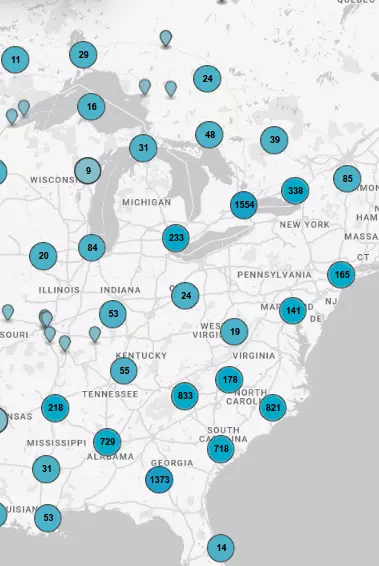Georgia R.R. and Banking Company
On May 21, 1837, Georgia Railroad and Banking Company operated from this place the first railroad in Georgia. It is the oldest railroad in Georgia continuously operating under its...
- lat34
Georgia's First School of Medicine
The property on which the Widows Home is located was the site of Augusta`s first City Hospital. Constructed in 1818, the hospital provided for the `sick poor` of Augusta and later evolved into...
- lat34
White House Tract
The 500-acres parcel of land long known as the `White House Tract` witnessed many of Augusta`s most significant historical events. On this tract an Indian trading company known as MacKay´s Trading...
- lat34
Liberty Methodist Church
Liberty, which evolved out of a Methodist society organized about 1775, is Georgia`s oldest Methodist Church. The original log church was erected west of here by Samuel Collins who, in 1773, had...
- lat34
Paine College
Paine Institute, rechartered as Paine College in 1903, was founded Nov. 1, 1882, by the Colored Methodist Episcopal Church and the Methodist Epicscopla Church, South, at the urgent request...
- lat34
Two Early Augusta Churches
St. John Methodist Church was founded in 1798 by Stith Mead, a young Virginia minister who denounced the worldliness of fun-loving Augusta. Bishop Francis Asbury visited the church and watched its...
- lat34
Signal Corps Aviation School 1911-1913
On the Barnes farm, south and east of this marker, one of the first military aviation training centers in the U. S. was established in 1911. After successful test flights of the second...
- lat34
Birthplace of General Joseph Wheeler
A short distance north of this place, General Joseph Wheeler was born on Sept. 10, 1836. He graduated from West Point in 1859 and held the rank of 2nd lieutenant when the Civil War broke out....
- lat34
LaFayette Visits Augusta
This is the site of the old Planter`s Hotel, which was burned in 1839. There the Marquis de LaFayette was entertained during his visit to Augusta in March 1825. LaFayette landed at Savannah on...
- lat34
Bellevue
Home of Freeman Walker, outstanding citizen of early Georgia. Born in Virginia in 1780, he came to Richmond County in his youth and studied law. Freeman Walker, in 1826, deeded 70 acres of land to...
- lat34
Fort Grierson
Approximate location of Ft. Grierson, named after British Lt. Col. James Grierson, who commanded a temporary stronghold at this place during occupation of Augusta by the British under Col. Brown...
- lat34
The Home of Charles Jones Jenkins, Jr., LL.D.
After rendering valuable aid to his State as a justice of the Georgia Supreme Court (1860 - 1865). Charles Jones Jenkins was elected Governor in 1865. For defying certain reconstruction measures...
- lat34
Montrose: Home of Col. Charles Colcock Jones, Jr.
Col. Jones, the `Macaulay of the South,` was born in Savannah in 1831, the son of Charles Colcok Jones, Sr., D.D. Presbyterian divine. He graduated with distinction from Princeton in 1852 and...
- lat34
Pierce Memorial Methodist Church
One of the early Methodist Churches in this section, Pierce Memorial was first called Rocks Church, then Pierce Chapel for Bishop George F. Pierce, leading Georgia Methodist. The first building...
- lat34
Summerville Cemetery
In this cemetery are buried the following eminent Georgians: JOHN MILLEDGE (1757-1818), Revolutionary officer, Congressman, Governor (1802-1806). He gave the land on which the University of...
- lat34
Birthplace of Augusta Chronicle
On this site August 30, 1785, Greenburg Hughes published Augusta`s first newspaper, the Augusta Gazette, which continued, after he went to Charleston, until September 30, 1786, when John Erdman...
- lat34
Hephzibah Methodist Church
The Brothersville Methodist Church was organized in March 1852 in the community of Brothersville to serve the fifteen families living there. The building completed in 1853, was dedicated in...
- lat34
Home of Richard Henry Wilde
Richard Henry Wilde, one of Georgia`s most gifted sons - poet, scholar. lawyer, statesman. lived in this house from 1825 to 1842. Born in Dublin, Ireland, Spet. 24, 1789, he moved to Augusta...
- lat34
Fort Augusta-Fort Cornwallis-St. Paul's Church
This site selected by fur traders Kennedy O`Brien and Roger de Lacy as a trading post to be nearer the Indians than Savannah Town, (in present Beech Island). To protect them and others,...
- lat34
The Medical College of Georgia
The Medical College of Georgia, oldest school of medicine in Georgia, was incorporated in 1828 as the Medical Academy of Georgia. Of the 23 original board of Trustees, 5 were from the City of...
- lat34
